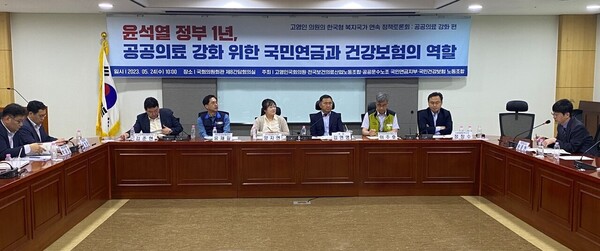
The government should use the national pension fund to strengthen public healthcare, union leaders said Wednesday.
Such an argument was made at a debate co-organized by Rep. Koh Young-in of the opposition Democratic Party of Korea, the Korean Health and Medical Workers Union (KHMU), the Korean Public Service and Transport Workers Union (KPTU)’s National Pension Branch and the union of the National Health Insurance Service (NHIS) to discuss national pension fund’s role in strengthening public healthcare service.
Yang JI-youn, senior vice chair of the KPTU’s National Pension Branch, emphasized the need to invest in national pensions to expand public healthcare, saying that the types of welfare projects allowed under the National Pension Act include “installing and operating hospitals and nursing facilities and lending funds.”
"If we can create one success story by investing even 1 percent of the new surplus of the national pension fund, it will be the beginning of creating a virtuous cycle of welfare investment," Yang said.
As of the end of February 2023, the national pension fund's portfolio totaled 939 trillion won ($713 billion), with only 1.4 trillion won, or 0.1 percent, dedicated to welfare and other areas.
Lee Ju-ho, head of the KHMU’s Policy Research Institute, also said that the national pension fund should be invested in expanding public healthcare to actively respond to the rapid population aging and the disappearance of regional communities.
However, Won Jong-hyeon, a full-time expert member of the National Pension Fund Management Committee, said it needs to be cautious about investing the national pension fund into replenishing public healthcare infrastructure.
“To stress the need for investing pension fund into public health expansion, it needs to prove its value as a project,” Won said. “The argument that social investment should be used as a vehicle for policy support is unsustainable."
Therefore, they need an evaluation system that can specify the return on investment and demonstrate the value to the public to create a virtuous cycle of social benefits, Won added.
Park Jae-man, director of the National Pension Policy at the Ministry of Health and Welfare, also said, “It is important to know what the guiding principles of a national pension fund are. There can be conflicts of values and perspectives."
Park added that the national pension system is responsible for paying reimbursement, so profitability and stability are fundamentally important.
“In that sense, it is crucial to make sure that investments in public healthcare are profitable and that they don't undermine public confidence (in national pensions),” Park said.
Emphasizing the need for discussing the feasibility of investment (into public healthcare) through a consensus structure, Park said it is essential to prove that investment into public healthcare saves medical costs and social insurance’s burden in the long term.
Although the government maintains the position that it needs to be cautious in directly investing national pension fund (into public healthcare), the discussion (about national pension fund’s investment into public healthcare) will become more vigorous if they prove such investment can prove certain roles in promoting social profits,” Park said.

